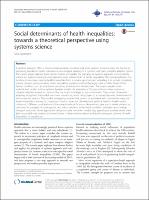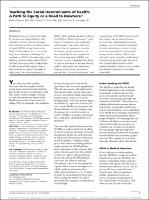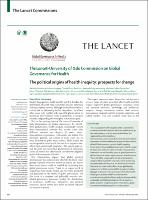Browsing 1.01.02 Structural & Social Determinants of Health by Title
Now showing items 7-9 of 9
-
Social determinants of health inequalities: towards a theoretical perspective using systems science
(2015)
A systems approach offers a novel conceptualization to natural and social systems. In recent years, this has led to perceiving population health outcomes as an emergent property of a dynamic and open, complex adaptive system. The current paper explores these themes further and applies the principles of systems approach and complexity science (i.e. systems science) to conceptualize social determinants of health inequalities. The conceptualization can be done in two steps: viewing health inequalities from a systems approach and extending it to ... -
Teaching the Social Determinants of Health: A Path to Equity or a Road to Nowhere?
Medical schools are increasingly called to include social responsibility in their mandates. As such, they are focusing their attention on the social determinants of health (SDOH) as key drivers in the health of the patients and communities they serve. However, underlying this emphasis on SDOH is the assumption that teaching medical students about SDOH will lead future physicians to take action to help achieve health equity. There is little evidence to support this belief. In many ways, the current approach to SDOH within medical ... -
The political origins of health inequity: prospects for change
(The Lancet, 2014-02-11)
Despite large gains in health over the past few decades, the distribution of health risks worldwide remains extremely and unacceptably uneven. Although the health sector has a crucial role in addressing health inequalities, its eff orts often come into confl ict with powerful global actors in pursuit of other interests such as protection of national security, safeguarding of sovereignty, or economic goals. This is the starting point of The Lancet–University of Oslo Commission on Global Governance for Health. With globalisation, health inequity ...



